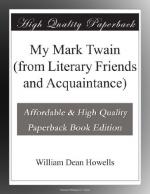To make an end of these records as to Clemens’s beliefs, so far as I knew them, I should say that he never went back to anything like faith in the Christian theology, or in the notion of life after death, or in a conscious divinity. It is best to be honest in this matter; he would have hated anything else, and I do not believe that the truth in it can hurt any one. At one period he argued that there must have been a cause, a conscious source of things; that the universe could not have come by chance. I have heard also that in his last hours or moments he said, or his dearest ones hoped he had said, something about meeting again. But the expression, of which they could not be certain, was of the vaguest, and it was perhaps addressed to their tenderness out of his tenderness. All his expressions to me were of a courageous, renunciation of any hope of living again, or elsewhere seeing those he had lost. He suffered terribly in their loss, and he was not fool enough to try ignoring his grief. He knew that for this there were but two medicines; that it would wear itself out with the years, and that meanwhile there was nothing for it but those respites in which the mourner forgets himself in slumber. I remember that in a black hour of my own when I was called down to see him, as he thought from sleep, he said with an infinite, an exquisite compassion, “Oh, did I wake you, did I wake, you?” Nothing more, but the look, the voice, were everything; and while I live they cannot pass from my sense.




